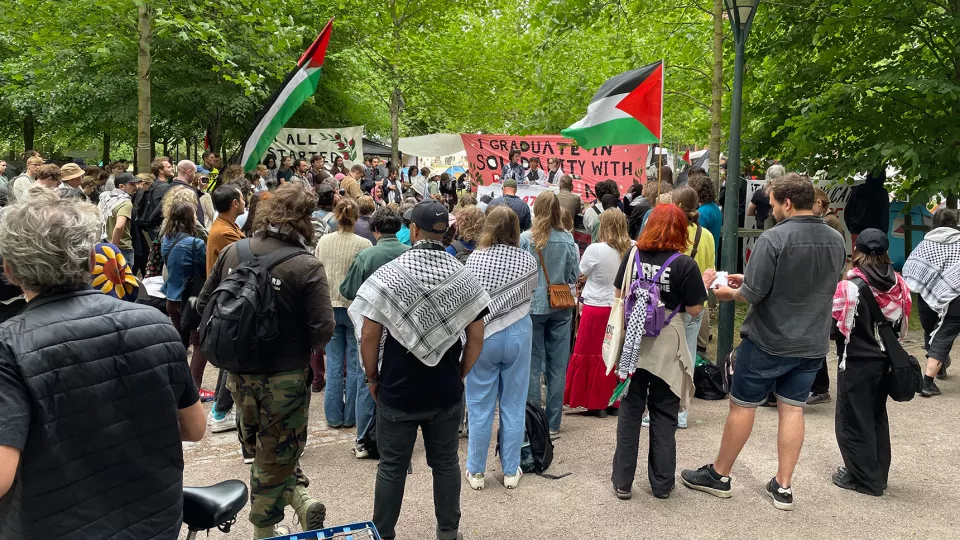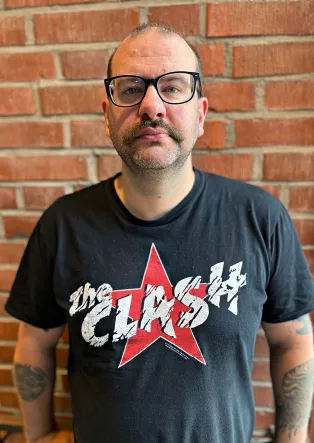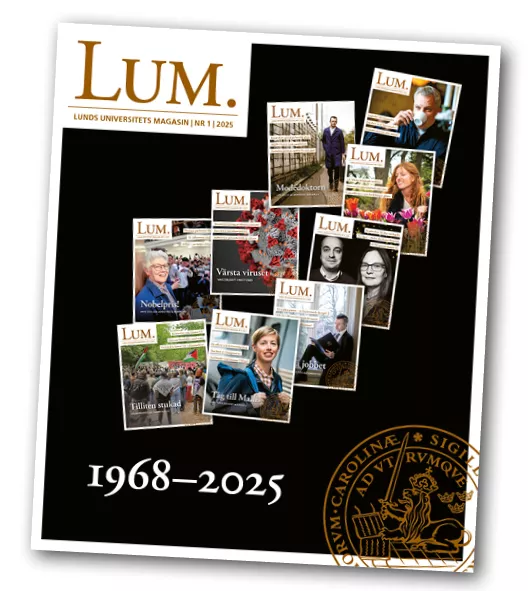Outside the King’s House, in what demonstrators quickly renamed ‘Palestinagård’ four students are sitting in a circle on the lawn. They are active in the student movement calling itself Lund Students for Palestine, LSFP, and all took part in the encampment at the end of the spring semester. They agree to be interviewed, but do not wish to share their names or photographs in LUM, mainly for safety reasons after several of them had their personal details published on far-right websites.
The students establishing their camp was part of a national and international movement: a protest against academic cooperation with Israeli institutions which were considered to be contributing to the destruction of the education system in Gaza. They look back on the time in the tents as a “wonderful experience of standing together in solidarity” even if the actual decision to set up camp sprang from a feeling of not being listened to. They describe feeling an increasing frustration at not establishing a dialogue on what was happening in Gaza and what the University might have done to influence and take a position.
“I have organised lots of student actions in the past, but I have never felt ignored in that way before,” one of the students says.
Together, they promoted demands including academic boycotts and for Lund University to support a declaration in support of Palestine. Two short meetings with management took place, but after the second – which saw police being called to the King’s house – all contact was broken off.
No regrets
The students LUM talk to do not feel that they should have acted differently at any stage.
“Of course there is an ongoing discussion within our group on that subject, but I think the actions that the student movement took in order to bring about a dialogue were done correctly,” says one of the students, explaining how they first sent out a petition, talked to staff, tried to book meetings and used the official channels.
“Clearly, we have not achieved our demands, so presumably there are a lot more things we could have done. But from here I think it is more a case of making contact with the academic staff and students on campus. Our experience suggests that there is broad support for this,” says another.
"Met with silence"
The students argue that the gulf between the students and the University Management is not only down to the stranded dialogue, they also claim to have experienced a lack of knowledge at the top of the organisation in terms of international law, human rights and more. The fact that the encampment was cleared by police, and that a number of protestors are now facing trial is also a contributing factor.
“We would really like to see that gap bridged, and we are prepared to discuss that. But I think the gulf is just getting wider at the moment, since we are still being met with silence and since students are regarded as criminals and being prosecuted.”
The students retain their earlier demands – that the University supports a boycott, a statement of solidarity and refuge for Palestinian academics. Above all, they want to see continued dialogue.
“In Denmark, Norway and Finland, we have seen really good conversations within universities and progress has been made on all fronts. In Stavanger, for example, an academic boycott has begun and in Copenhagen collaborations with certain companies have been cut short. These are achievable goals, completely in line with what LU has done in the past, for example on Ukraine.”
“We want to have discussions in good faith, and for the University to act consistently.”
“Continuing dialogue with the protestors is the way forward, but that has to be through the student unions. The direct discussions between management and the protestors have reached the end of the line.”
So says Lund University’s Vice-Chancellor Erik Renström. He explains how he has met protestors in various situations. Some conversations have been good, others less so. The discussions have not resulted in agreement. There is one thing he regrets.
Most demands impossible to meet
“We should have established clearer paths to the student unions earlier on, for those parts where protestors’ commitment could have been harnessed. They represent all students and we have very good, constant contact with them. The fact that we did not decide on doing things that way earlier on may have created an ambiguity in our communication.”
Most of the protestors’ demands are not things the University can bring about without breaking the rules on what public authorities are permitted to do and say. One thing that the University can, indeed should, do, is help destroyed academic institutions in Gaza and other vulnerable regions of the world so that they can start functioning again.
“I have asked for constructive suggestions about things that the University can do. I look forward to those kinds of conversations,” says Erik Renström.
Will take time to heal
The differences of opinion between protestors and management, among students, and between members of staff have opened wounds. In some cases they are deeper than others. Wounds that, according to Erik Renström, will take a long time to heal. The University Management, but even more so faculty and departmental management, will need to focus on this for a long time to come.
“We must be able to cooperate and work together under one roof. That is going to require great commitment in some cases so that the work environment and study environment are able to function,” he says.
During the interview, Erik Renström repeatedly returns to the importance of understanding the University’s role and remit as a public authority. The constitution and other laws surround our activities, the principle of neutrality and objectivity can never be compromised. Petitions that have been circulated have sometimes been based on misunderstandings, he suggests.
“Some students and staff members have limited knowledge of what the University’s remit is, and what laws and principles constrain our activities. In general, awareness in this area needs to improve. Perhaps we have reached the stage where it is necessary to have some kind of shared contract.”
Staff can be activists
To the question of whether one can be a researcher and an activist, his response is an unequivocal yes.
“Without a doubt. The University never has any viewpoints about what opinions staff may have in the private sphere. But if there are consequences for the work environment and how the staff member carries out their work, we are obliged to act. I sometimes notice that some people find that difficult to believe,” he says and goes on:
“The exception is me. I cannot express something that is not compatible with the University as an authority. That also applies to my private life.”
He explains that he has been wrestling with mixed emotions since 14 May, when the first tents were erected in Lundagård. What has not emerged are the positive aspects,” he explains.
“In a way, I am glad it happened because it demonstrates that the University is an important force in society. We are a cultural asset and what we do matters to a lot of people. That is what is positive about it – that it happened here.”
“It is going to take time to restore the trust and confidence between pro-Palestinian students and the University Management, and between staff who have expressed a view in support of or in opposition to the protestors. But if these differences of opinion are tackled in the right way, the University can emerge stronger from the conflict,” says Psychology Professor Philippe Goldin.
LUM met with him before his return to the USA and the University of California Davis, where his research includes strategies for dealing with emotions.
How to bridge the gap
Communication is all important in bridging this gap in trust, he underlines. If protestors, management and staff who hold opposing views do not talk to each other, the wounds will not heal. Time, the patience to listen, and an openness to the opinions of others are ingredients in the process of rebuilding trust.
Philippe Goldin suggests creating a small group that represents differing views. This group should, he says, include protestors, students with differing opinions, university management and various categories of staff. A total of around twelve people. In addition, there should be a professional arbitrator with no links to the University who has the trust of all involved. In a first meeting, it might be best to not even mention the differences of opinion and why the meeting is taking place, he argues. It is also important to make clear what one has control over and what one does not. The manner in which the police cleared the encampment is an example of the latter.
At the second or third meeting, the central issue can be approached. According to Goldin, one way of doing things is to try and agree on values that everyone can get behind and that are clearly communicated outwards. Peace, freedom and solidarity are a few examples.
What difficulties do you anticipate in the process?
“Strong emotions that do not allow people to think clearly, such as fear, anxiety and anger. Another obstacle could be the selection of those who join the group that meets.
How can similar wounds be avoided when it comes to future conflicts around the world?
“The most important thing is to communicate openly and sincerely. Personally I think that conflict resolution should form a natural part of the introduction for all new employees. And preferably for students too.”
Is this kind of conflict always a bad thing?
“No. Conflicts can be a good way of deepening and expanding understanding of others and their opinions. If, however, people dig themselves into the trenches and do not communicate in a sincere way, there is a risk that the conflict can easily be exacerbated.”
Nina Gren is one of the employees who supported the protesting students during the spring, both in opinion pieces and in person at the encampment.
“I feel that as a researcher, I have a responsibility based on the knowledge I possess after 20 years’ research into what everyday life looks like for Palestinians in the Occupied Territories. Taking a stand for something as fundamental as the right to life is not particularly difficult. For me, it would be absurd not to do it,” she says.
Mixed emotions
Nina Gren explains that she has mixed emotions about the spring semester. On the one hand an admiration for the students’ enthusiasm, thirst for knowledge and capacity to organise themselves. On the other, incomprehension at the way she feels the University Management has acted.
Nina Gren believes that a better dialogue at all levels is necessary in order to get closer to the protesting students as well as the staff like her who are disappointed.
Discussions are needed
“I do feel a disappointment that so many of my colleagues were not prepared to stand up for our students. That is why I feel we should start the autumn semester by tackling these issues. For example – what does it mean when we teach about human rights, about war and peace, about racism? What does it mean, practically, to be engaged with wider society? We cannot downplay what is going on and we must at least be able to discuss why we do not agree.
She feels that the same thing should apply to the University Management.
“Besides an academic boycott of Israeli universities, the fundamental issue was that the students wanted the University Management to make a statement in support of Palestinian Academics and students. Why can we not even talk about that?”
The tone of the debate has been intense, but no one appears to have crossed the line for what may be punishable by law. That is law professor Vilhelm Persson’s summary of what staff have said and written in connection with the pro-Palestinian protests.
“In terms of what is permissible to say, I have not seen, heard or read anything that came close to being illegal. What one should say is another matter entirely, and not something I want to make a judgment on,” he says.
Employees at the University have differing views on the student protests. Most importantly, in legal terms, is the fact that the University Management has not attempted to restrict employees’ freedom of speech,” Vilhelm Persson argues.
“As an employer, the University has the right to expect employees to do their jobs and make every effort to maintain a good work environment. Management should not, however, have opinions about what employees say privately, that is as far as the legal element stretches in all of this,” he says.
A world of difference
According to Vilhelm Persson, there is a world of difference between what public servants can say privately and what they may express in a professional capacity. Privately, employees may express almost whatever they like, as long as they do their job and treat everyone equally. When it comes to statements in a professional capacity, the opposite is true. There, public servants have essentially no freedom of speech.
Vilhelm Persson describes it as the long arm of the state and the law, which is to apply the rules in an objective and impartial way. Any real freedom to express opinions about one thing or another does not exist.
“In practice, it might be difficult to draw the line between what is said privately and what is said in a professional capacity, so it is therefore difficult to say exactly what is and what is not acceptable,” he says.
What about students, what rules apply to them?
“They can do and say as they please, as long as they do not commit any crimes. They do not need to be objective and impartial.”
Respect ought to govern
According to what Vilhelm Persson has seen and read in the media, no legal infractions have taken place in the debate, but the law does not measure what constitutes a healthy climate for debate. That is why, he argues, it is important to discuss what the climate for debate should look like at University and in wider society. Regardless of opinion, respect ought to govern how we behave towards each other in the workplace.
“Society would be rather unpleasant if everyone fully exploited their right to freedom of speech all the time. If it was always teetering on the edge of insults, slander and hate speech that would make for a very bleak climate for discussion, in my opinion.”
In 1968, Sweden was bubbling with dissatisfaction and an urge to protest. The Vietnam War, the Davis Cup in Båstad, in which Sweden were to play Rhodesia, the apartheid system in South Africa and Swedish compulsory military service were a few of the things that riled young university students above all and that led to protests, occupations and police interventions throughout the country.
Then, as with this year, Lund was one of the centres of the protests.
Similarities to 1968
Martin Ericsson, researcher at the Department of History, has addressed political and social protest movements in his research for a long time, and he sees several parallels between 1968 and today’s student protests.
“Many of the 1968 protests were about international issues. The Vietnam War, of course, but a lot of people in Lund also became involved in fighting apartheid and racism in different parts of the world. Today’s protests are also concerned with an international conflict.
Another similarity is inspiration from the USA, Martin Ericsson explains. That is where the 1968 protests originated, and that same year representatives of the Black Panthers, a socialist organisation fighting for the rights of African Americans, visited several Swedish universities.
“When it comes to the Palestinagård protests, we see the same thing – they have taken inspiration from American students’ methods of setting up camp and demonstrating on campus.”
... and differences
A marked difference between the protests of then and now is the response of politicians, Ericsson argues. For example, at the height of protests against compulsory military service in 1968, Prime Minister Tage Erlander found himself eating dinner in AF Borgen having inaugurated the new university hospital. On finding this out, protesters made for the building, got inside, and demanded to speak to the Prime Minister. Tage Erlander interrupted his meal and went out to meet the students.
“That’s very different to today, when our leading politicians express themselves as though the protesting students were perpetrators of violence,” says Martin Ericsson.
So, what was the significance of the 1968 student protests? According to Martin Ericsson, none of the students’ direct demands were met, but in the longer term they still contributed to important changes. An important example is the democratisation of Swedish higher education institutions, which resulted in the extensive student influence we see today.
“The same thing still applies – there is nothing to suggest that the University will implement the demands that the students issued, but society is discussing and debating the conflict in Palestine in a way that was not happening before,” says Martin Ericsson.
Jan Olsson and Minna Wallén-Widung









